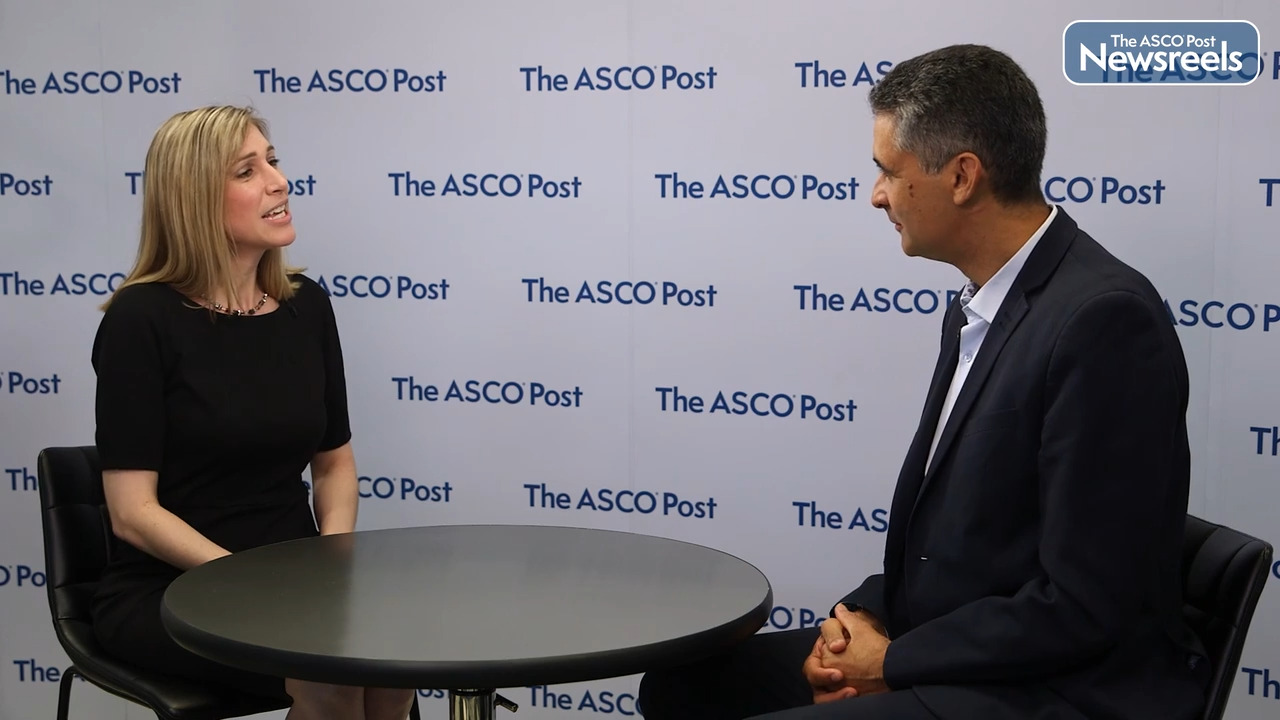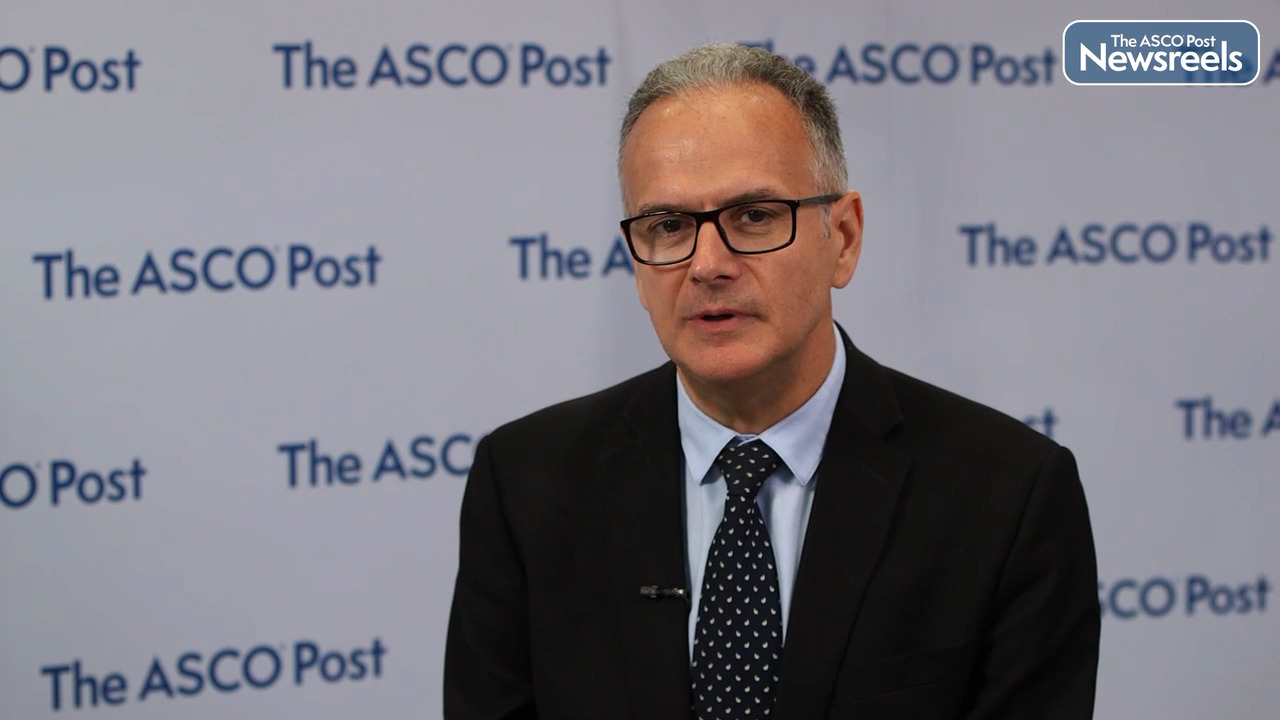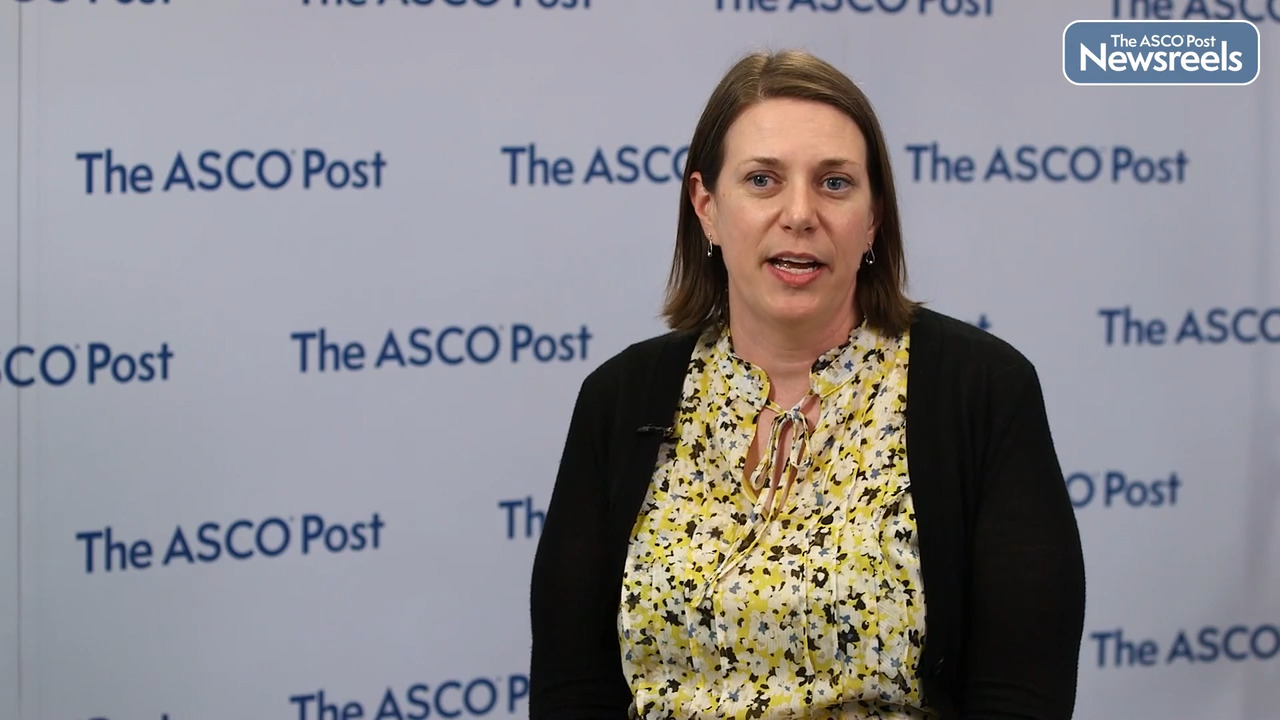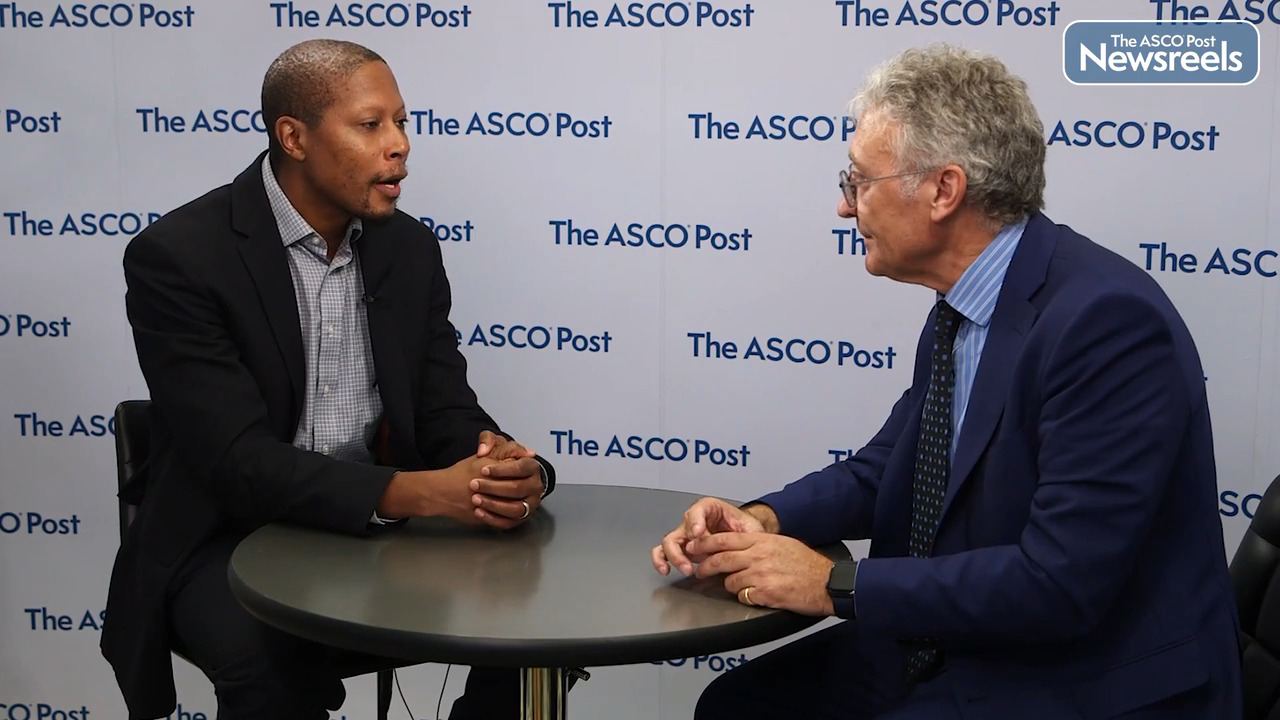Transcript
Disclaimer: This video transcript has not been proofread or edited and may contain errors.
Narjust Florez, MD:
Thank you Roy, for being here with the ASCO Post.
Roy S. Herbst, MD, PhD:
Oh, pleasure, Narjust, great to be here.
Narjust Florez, MD:
First, this is changing care forever and you are the principal investigator for the ADAURA Trial. This is a study that we learned in 2020, was one of the few little things that actually gave me joy during the pandemic, was hearing you, from home, presenting ADAURA. But now is the time for overall survival data. So Roy in quick seconds, can you summarize the design of ADAURA?
Roy S. Herbst, MD, PhD:
Oh sure, so the ADAURA trial, which incredibly began about 10 years ago, even before osimertinib was approved in the frontline setting in the US, basically takes patients with completely resected early stage lung cancer. So stage 1B to 3A and patients can receive chemotherapy if they're applicable for that, and then they're randomized to either osimertinib 80 milligrams orally once a day or a placebo, and they receive that drug for three years, with the primary endpoint being disease-free survival.
And as you mentioned, it was presented early three years ago with hazard ratio of 0.17 in the stage two, three population, 83% improvement in disease free survival. So that was thrilling data and it also resulted in the approval in many places, including the US and in many people using the drug. However, there was always that concern. What about overall survival? Despite the fact that we saw wonderful effects in the brain and our metastases, everyone's been eagerly awaiting that. So I'm thrilled to be back again on the plenary, now here in 2023, to present the overall survival.
Narjust Florez, MD:
And I think it's just fair that you get a plenary in person, because you did the first plenary virtually and you worked your entire life to develop a study over a decade. So now it's time for you to be in the main stage.
Roy S. Herbst, MD, PhD:
It's much more fun that way. I got to tell you. It's great being here and seeing people and communicating the results and having patients here to react to it because you can see how people feel about it. It's really great.
Narjust Florez, MD:
And overall survival is still going to be the landmark for many of our studies, particularly in the adjuvant setting. So let's talk a little bit about the results. So we know the study is positive for overall survival. So where do we see the benefit? Which group benefit the most? Let's start with that, when the use of osimertinib in the adjuvant setting?
Roy S. Herbst, MD, PhD:
Well, if you look at the primary population, stage 2 and 3A disease, the hazard ratio was incredibly 0.49, so a 51% decrease in death. And even when you add the stage 1 patients in, it was still 0.49 with that 51% decrease. Now, when you look at an exploratory analysis by subgroup, we saw the point estimates less than one in every subgroup. Surely, some of the subgroups have few events so that the confidence intervals just slightly cross one. But for the most part, almost every group we've looked at, does show that benefit.
Narjust Florez, MD:
And is a hazard ratio 0.49, right? That's something that we cannot question. We cannot even fight it over Twitter. It is a 0.49 hazard ratio.
Roy S. Herbst, MD, PhD:
Right, we have median follow up of more than five years in each group. The curves separate very early at the five years, I think it's 85% versus 73% survival in the stage 2 and 3 group. It's really just very, very robust data. The median's not been reached yet in either of the groups, so we're going to have to continue to file this. One thing I'm very proud of is the team has made the decision, the investigators, AstraZeneca, we're going to continue to keep an eye on this trial and we'll update it from time to time. It's also important now to look at all the molecular studies from the blood-based tests that we did.
Narjust Florez, MD:
And I think it's very important the study will continue and we'll continue to hear and we'll continue to see you. So along those lines, CNS, CNS recurrence is a big issue for patients with EGFR disease, particularly when they believe they're cured. How can you summarize the benefit in the CNS?
Roy S. Herbst, MD, PhD:
Well, even before we had OS, I thought DFS was surely compelling enough to move forward, because when we looked at first recurrence of progression in the brain, the hazard ratio was 0.2, 0.27, 80 plus percent improvement. So we know that one of the reasons we could use osimertinib, a third generation drug, is because it's more potent, because it gets into the CNS, it targets T790M and we could give it for longer periods of time because it's better tolerated. So I think the fact that we have activity in the brain is huge. That's probably one of the reasons we're seeing a survival benefit. But you know, you care for patients, as do I, patients are always concerned. The advocates, the patients that I take care of, will the disease go into my brain? So the fact that we have something that can help in that way, is truly huge.
Narjust Florez, MD:
And it's very important because a lot of patients with EGFR disease are very young, fully functional. And when the CNS, we have recurrence, the CNS is just so detrimental to their health and their quality of life.
Roy S. Herbst, MD, PhD:
Right, and we try to do focal therapies now like gamma knife, but even then, it's how much of that can you do. So if you can prevent the disease from ever going to the brain, and that's the mantra. I think we've talked before that I've seen this field develop over the last 20, 30 years where we've taken EGFR inhibitors and now we're using them in the most precise situations with EGFR mutational testing. And now of course, we have better generation drugs. When we use them early, we prevent metastases. And when you think about why patients die from lung cancer and have morbidity, it's metastases. So we're preventing metastases with this drug and also, nicely showing that we're improving survival as well.
Narjust Florez, MD:
Yeah, it's better if it's not on the brain. So one of my last questions is how will you break down the overall survival results to the community oncologists? Some of them are not here, some of them are caring for our patients at this time. How will you summarize that to them?
Roy S. Herbst, MD, PhD:
Well, I would say that these data now, and thanks to programs like yours, need to get out there. And I would tell the community oncologists and the patient, you have to think about the two of them being in the room together. You got to be tested for EGFR, and that's got to be done early because you need that data early on. In fact, I would say we should even start screening more people for lung cancer. We might even need to look at the screening guidelines to be a little bit more lenient to allow for lesser smoking history. That's something we should talk about. But I would tell the community oncologists, "Look, we had DFS data, the drugs approved. If your patient's reluctant, if you're concerned at all, if your surgical colleagues..." Often it's the surgeons who will say, "Where's the survival?" That's the way it is at Yale, they always ask me.
"There is now survival data. It's quite compelling. This is something that should at least be put on the table and offered to the patients." And I think the patients will see these data too in some of the different forms and say, "Look, we heard the NCI Director today at this meeting talk about decreasing cancer death rates by 50%." In this one trial, we've sort of done that, and now we have to do it across the board. This is significant. So I would just make sure people knew this was significant. Some might choose not to do it. There's some people after they've had surgery or chemotherapy, they're just done. But I think that I would certainly try to encourage patients to do it, because the data are so compelling.
Narjust Florez, MD:
Well, thank you so much for your time and thank you for changing the standard of care because care is better thanks to the work you do. Thank you.
Roy S. Herbst, MD, PhD:
Well great for patients and that's why we're here.
Narjust Florez, MD:
Thank you.
Roy S. Herbst, MD, PhD:
Thanks.





